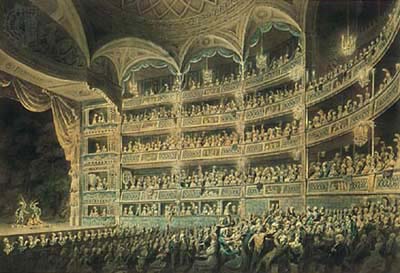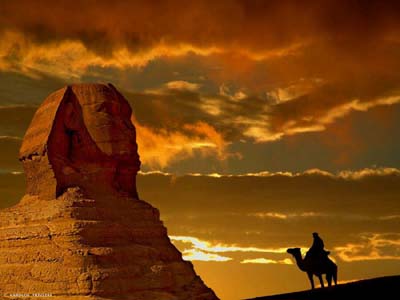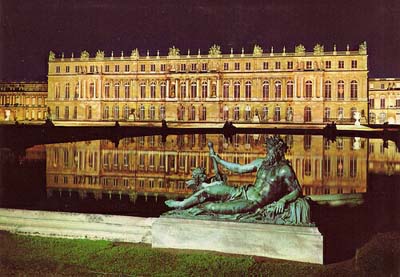 |
Organic Society
Discerning the Historic Roles of Nations
Plinio Corrêa de Oliveira
Based on the presuppositions established in our last article on the dynamism of individuals and peoples, we move on to examine how a nation is formed and developed, conditioned by a rule and a situation that are extraordinarily beautiful.
History can be compared to a long theater play with many episodes and performers. An actor may remain for some time behind the curtains, preparing for the moment he will enter the stage and perform his role. His entrance marks the tenor of the play. Then he leaves and does not appear again. But the memory of his deeds remains, and at times someone refers to him even though the play continues with other players and events.

History is like an enormous theater
where each nation plays its role |
So it happens with nations. I would say that the nation pre-exists its historic role. It remains in an embryonic formation, in a kind of hazy development that occasionally reveals its future role, but it will only come to light when its hour arrives. When that moment comes for a nation, it assumes its full character and enters History. After performing the role designed for it, it retires behind the curtains and often becomes, depending on the case, a normal nation that conserves the memories of that grand hour when it played its great role. Or it can simply disintegrate into the dust of History. It depends on circumstances and the designs of God.
In this respect, Divine Providence acts in two different ways that intertwine harmonically to accomplish the same design. In one case, Providence follows the natural order of things without intervening to award or chastise the nation. In another, God intervenes and acts above the natural order to recompense or to punish it. Awards and chastisements also interlace and form the post-history of a nation.
For example, consider Egypt. Undoubtedly it re-emerged in History with a kind of post-history as world travel became popular and archeology developed in the 19th and the beginning of the 20th centuries. This was the period of Jean-François Champollion and his discovery of how to decipher Egyptian hieroglyphs. It was also the period when England amassed an enormous collection of Egyptian works of art discovered on archeological digs. Consequently, the British Museum played an important role in developing modern Egyptology. These factors helped return to the limelight that ancient history which seemed buried forever in the sands of the African desert.
Thus, those discoveries marked modern times in a way that the ancient Egyptians could never have imagined At the very moment the Revolution was conspiring to destroy all the grandeur on earth, the image of ancient Egypt with its grandeur and mystery re-surfaced.
As the French Revolution spread throughout the West preaching its utopias of universal fraternity and trying to annihilate everything that symbolized grandeur, Egypt returned to the stage as if to say: “No matter how much you try to achieve your petty utopias, when you look at my pyramids and sphinxes you understand the futility of your efforts.” The revolutionary messianism based on the industrial, electrical and electronic revolutions will never equal those monumental works of the past.

The prestige of the Sphinx harmed the utopias of the Revolution |
The prestige of the Sphinx in many ways curtailed the élan and the prestige of the Statue of Liberty. The souls of many would have had more enthusiasm for the Revolution but for the entrance of the Sphinx onto the scene. It is an eminently selective symbol that invites man to decipher it, and the world belongs to men who can decipher situations. Only such men can really lead and command others.
I am not saying that those discoveries stopped the march of the Revolution, but that its pace would have been faster if the mystery and grandeur of ancient Egypt had not re-surfaced.
With this, we have an example of the post-life of a people. In its own time, Egypt came from behind the curtains of History to enter the stage; then it played its part, marked that epoch of Antiquity and returned to sleep in the shadows of History. Then, some 2,000 years later, Egypt saw a new birth and again had a strong influence on History. Its role - in its life and in its post-life - makes up a fabulous ensemble that continues to model life and History.
Another example of grandeu, which lacks the monumental character of Egypt, is the Palace of Versailles. By its simple existence, Versailles plays a leading role in the polemic against the French Revolution. This polemic is, so to speak, personally directed by Louis XIV. The Palace stands there in Versailles as if Louis XIV were saying to the revolutionaries: “This is French grandeur! If you have the courage, come and see it, and then you will know that what you did has no grandeur.”

The grandeur of Louis XIV still hovers over Versailles |
The French revolutionaries who invaded Versailles thought they were definitively razing the Palace. They did not understand that, like a gigantic ghost, Louis XIV with his grandeur and airs, would defeat them by hovering forever over that place.
These actions do not direct History, but they diminish the dynamism of the Revolution in History; doing this, they play a role in guiding it.
When grandiose parts of the past, as in these examples, emerge from the grave of History and re-present themselves onstage, the only thing the revolutionaries can do is to be silent and allow History to project its picture of the past. Later, they do whatever they can to obliterate History and restart their revolutionary performance. These dead nations from the past arise from their sepultures bringing indisputable messages, like the just men after Our Lord’s death who rose from their sepultures to reproach the Jews for the Deicide. When one of these resurrections takes place, it is incontestable.
These are some of the rules on how the past acts on the present and influences it. The historical chronicles play only a modest role; the parts played by symbolism and memory are more representative and influential.
Continued here

Posted January 13, 2012

  | | Prof. Plinio |
Organic Society was a theme dear to the late Prof. Plinio Corrêa de Oliveira. He addressed this topic on countless occasions during his life - at times in lectures for the formation of his disciples, at times in meetings with friends who gathered to study the social aspects and history of Christendom, at times just in passing.
Atila S. Guimarães selected excerpts of these lectures and conversations from the transcripts of tapes and his own personal notes. He translated and adapted them into articles for the TIA website. In these texts fidelity to the original ideas and words is kept as much as possible.

Related Topics of Interest
 Discerning the Dynamism of Individuals & Peoples Discerning the Dynamism of Individuals & Peoples
 What Is the Res Publica? What Is the Res Publica?
 The Sky of Lorraine and the Kingdom of Our Lord The Sky of Lorraine and the Kingdom of Our Lord
 Vocations of the European Peoples Vocations of the European Peoples
 The State of Mind that Generated the Revolution The State of Mind that Generated the Revolution
 The Art of Organic Government The Art of Organic Government
 R-CR in the Tendencies, Ideas, and Facts R-CR in the Tendencies, Ideas, and Facts

Related Works of Interest
|
|
Organic
Society |
Social-Political | Home |
Books | CDs |
Search | Contact Us |
Donate

© 2002-
Tradition in Action, Inc. All Rights Reserved
|
 |
|